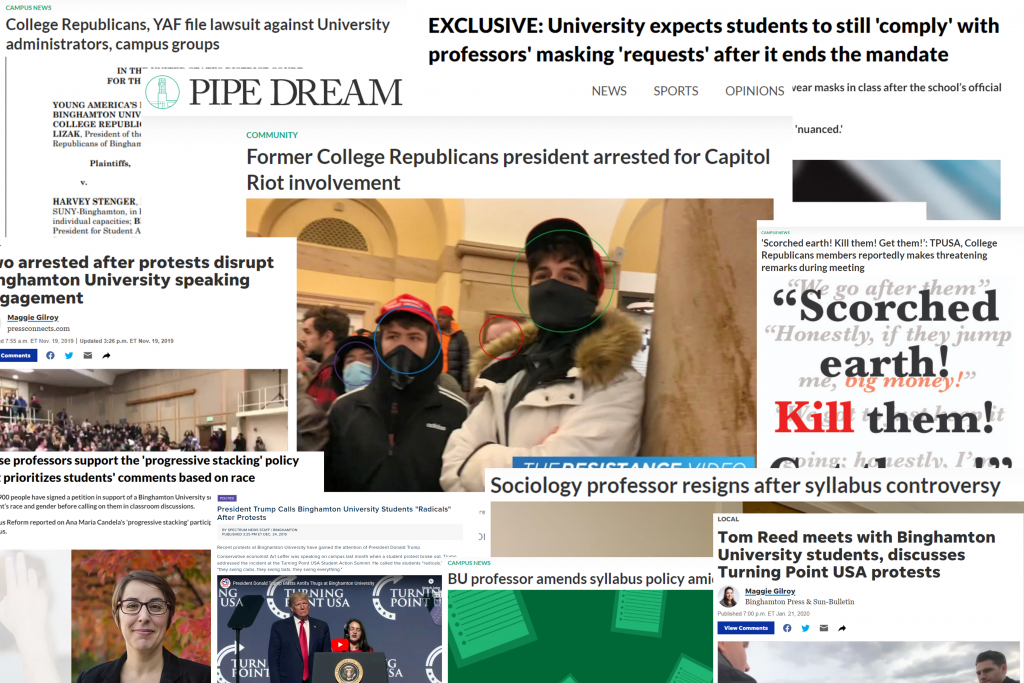Jon Lizak, the former president of Binghamton University’s College Republicans, is facing misdemeanor charges for his participation in the Jan. 6 U.S. Capitol Riots. Lizak had remained inside the U.S. Capitol for 35 minutes, according to an affidavit, even entering Nancy Pelosi’s office. Although the College Republicans have condemned Lizak’s alleged involvement in the riots, his actions are indicative of the way that right wing extremist ideology has permeated universities and youth, and of the organizations that support this.
The striking polarization and chaos that ensued over the “Trump era” — and reached a climax at the Jan. 6 riots — has also led to an increase in hateful and provocative groups and rhetoric. This dimension of political expression is especially concerning on college campuses, where youth are entitled to feel safe and welcomed in social and learning environments. Potential political conversation and negotiation is suppressed by hostility and extremity.
According to investigators, Lizak and the four young men with whom he is accused of breaching the U.S. Capitol are members of America First, a group that advocates against demographic shifts in the U.S. At BU, Lizak had been assisting in the chartering of Turning Point USA (TPUSA), a notorious conservative youth group with strong ties to former president Donald Trump and his family. The organization has millions in support from rich donors and backers, and has promoted false information about President Joe Biden’s 2020 win, COVID-19 vaccines and other issues. TPUSA’s website advertises their “college program,” which has over 500 college chapters.
Three years ago, Lizak and others had attempted to get TPUSA chartered at BU, indicative of the manner in which such extremist organizations seek to gain a foothold on college campuses. Along with the College Republicans, TPUSA had held a joint tabling event in which the line between free speech and hate speech was brought into question. TPUSA members toted pro-choice and pro-gun signs, including a sign that spelled out “co-exist” with images of rifles and firearms. Groups that advertise slogans and images like these are aware of their offensive and inflammatory nature. It is doubtful that such violent rhetoric would be utilized merely to spread awareness of a perspective or gather support — TPUSA’s demonstration was an attempt to assert dominance, and it sent shockwaves through BU’s student body, drawing hundreds of protestors. The tabling event, and ensuing events by the College Republicans, sparked such controversy and response from students that then-president Donald Trump himself commented on the situation, publicly mocking student protests.
But in tandem with Lizak’s arrest and TPUSA’s brief history on campus, we must also be mindful of the similar influence of national far-right publications on the campus community. Nationally, such publications have played an important role in spreading misinformation, especially regarding Biden’s election, but also in fanning the flames of controversy by posting provocative, and oftentimes offensive, content. On campus, national far-right publications have continued to use unethical practices in their reporting, leaving the campus community feeling unsafe.
Campus Reform, a publication that describes itself as “a conservative watchdog to the nation’s higher education system,” “recruits, cultivates and pays” conservative college students across the U.S. to “investigate and report liberal bias on college campuses.” Last spring, Campus Reform published multiple stories criticizing former BU sociology Professor Ana Candela’s progressive stacking policy. These articles went as far as to include screenshots of Candela’s syllabus, including the names and office numbers of her teaching assistants (TA’s) — a decision which led to TA’s feeling unsafe. A follow-up article had listed the names of professors which had publicly supported Candela, with each name hyperlinked to their faculty page, at which their contact information could be found.
These examples of unethical reporting practices were not limited to a mere few. That same semester, a Campus Reform article zeroed in on a specific TA in Candela’s course who had required masks to be worn after the mask mandate had ended. The article included screenshots of email exchanges between the TA and a complaining BU student — who works as a Campus Reform reporter — with the TA’s name clearly viewable. Exposing the name and the private correspondence of this TA was extremely unprofessional. Campus Reform’s actions were made possible through the help of a BU student reporter, because, as with TPUSA, Campus Reform uses such connections to gain footholds on college campuses.
These controversies and political divisions within BU’s community are indicative of the deeply politically polarized climate in which we live. However, right wing extremist organizations and publications that promote hateful and intolerant ideologies have no place in our society, especially not at college campuses like BU. The University should take steps to ensure the campus community feels protected, and it should listen to the voices of those who feel unsafe. Only through acknowledging the issue of political extremism on campus can the University begin to foster such conversations.



